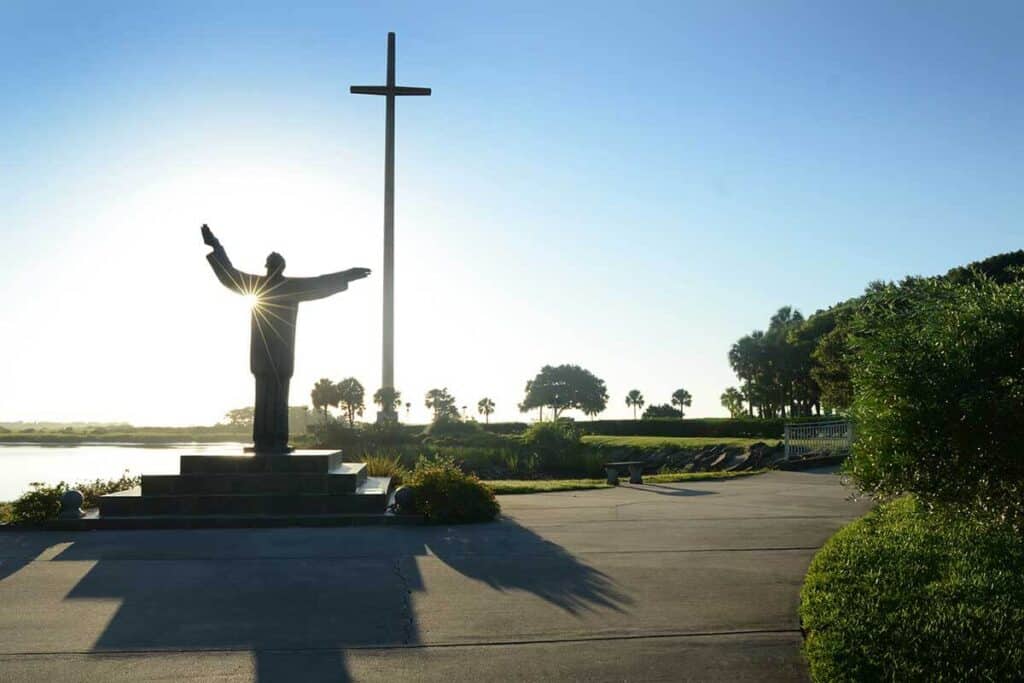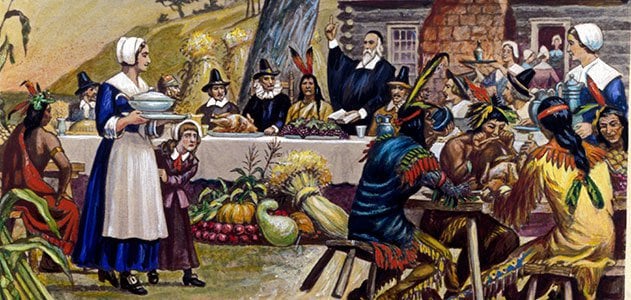The First Thanksgiving: A Spanish Affair?

As we sit down to Thanksgiving dinner and enjoy family and football, we may also recall the Plymouth pilgrims’ festivities with the Native Americans in 1621. However, could it be that this is not the true first Thanksgiving in North America? What if the inaugural celebration was much earlier and closer to home than the history books tell us?
On September 8, 1565, explorer Pedro Menendez de Aviles and 800 Spanish settlers first set foot on American soil at present-day St. Augustine, Florida. Upon stepping ashore, Father Francisco Lopez erected a makeshift altar and celebrated a Mass of thanksgiving for the Spaniards’ safe arrival. Afterwards, Menendez laid out a meal to which he invited the native Timucua tribe who were watching the proceedings and, as Father Lopez noted, were imitating “all they saw done.”
At this feast, the Spanish initiated a post-Thanksgiving tradition: eating leftovers. Unlike the Pilgrims, who consumed freshly-harvested food, the Spanish made do with provisions which survived the long Atlantic voyage. This was cocido, a rich stew made from salted pork, garbanzo beans, garlic, saffron, cabbage, and onion, accompanied by hard sea biscuits and red wine. The Timucua most likely contributed fresh food from their own stores: alligator, turkey, venison, gopher tortoise, mullet, drum, maize, beans, and squash.

This St. Augustine event, 56 years before the Puritans’ harvest festival, was the first community act of religion and feast of thanksgiving in the first permanent European settlement in North America. It took place just 300 yards north of the Castillo de San Marcos at what is now the Mission of Nombre de Dios and is marked by a massive 208-foot-tall metal cross and over-life-sized statue of Father Lopez carved of indigenous coquina stone.
It was in the 1980s that Michael Gannon, a University of Florida professor emeritus of history, first suggested St. Augustine’s claim to the inaugural Thanksgiving, which Northerners did not appreciate. Upon hearing the news, city officials of Plymouth, Massachusetts, called a special meeting, and the Boston Herald tagged Gannon the “Grinch who stole Thanksgiving.”
However, some claim that even this celebration was not the earliest on the American continent. Historians assert that 40 miles north from and one year earlier than the event in St. Augustine, French Huguenots held a service of thanksgiving and dined with the Timucua to celebrate the June 1564 establishment of Fort Caroline in present-day Jacksonville. In response to the late twentieth-century discovery of these Floridan feasts, Texas, Virginia, and Maine have also claimed to host the nation’s first Thanksgiving before the arrival of the Mayflower.

So why do we not celebrate these other “Thanksgivings” today? The conquerors write the history books, and in the eighteenth century the British were those conquerors, ousting both Spain and France to wield sole control over the American continent. Thus, it was British observances such as the annual reenactment of the pilgrims’ harvest festival in 1621 which became national practice. After the United States’ independence, Congress recommended one yearly day of thanksgiving, and George Washington suggested its date be November 26.
In the throes of the Civil War, President Abraham Lincoln in 1863 established the last Thursday in November as a National Day of Thanksgiving, finally making it a true holiday. The president called on the “whole American people” to unite in observing a special day of thanksgiving, and to “implore the interposition of the almighty to heal the wounds of the nation and to restore it…to full enjoyment of peace, harmony, tranquility, and union.”
Whichever “first” holiday we choose to adopt, we can all be thankful for the intrepid explorers who discovered this land and for the bounty that past generations unlocked for us today. Maybe we can also honor Lincoln’s exhortation to not only come together as families but to unite as a “whole American people” during this time, too. Happy Thanksgiving!
Interested in touring with Molly at St. Marys or Cumberland Island? Click here.


